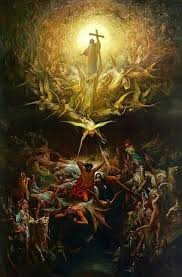A blessed All Souls’ Day to all our readers. Here is an article from our archives, which sums up the Church’s tradition of praying for the dead quite nicely. And please do keep in mind that the Church offers a plenary indulgence for praying for the holy souls in a cemetery during the next eight days, a novena for the departed, if you will. The conditions are you must say a prayer for the dead, a prayer for the Holy Father, and go to Communion and Confession ‘within a few days’, usually interpreted to be a week, one side or the other (Editor):
********
I am the resurrection and the Life, says the Lord. Whoever believes in me, even though he dies, will live, and everyone who lives and believes in me will no die for ever (Cf. Jn 11:25-26, Communion Antiphon).
The Commemoration of all the faithful departed or All Souls’ Day is a yearly occurrence that highlights a daily practice of the Church: the loving remembrance of our faithful departed in the Canon of the Mass. This memory that we keep daily and observe with due solemnity annually, affirms our belief in the Communion of Saints. The dead are alive. Though this may sound paradoxical, it is the truth. Today, we remember in a particular manner the Holy Souls in Purgatory. “The Church gives the name Purgatory to [the] final purification of the elect … [and] the tradition of the Church by reference to certain texts of Scripture, speaks of a cleansing fire” (CCC 1031). This doctrine is one of the most consoling of the Church’s teachings. Contrary to the Protestant belief that God immediately assigns a soul either to Heaven or to Hell, the Church teaches us that those who die in God’s friendship though imperfectly purified, undergo purification “so as to achieve the holiness necessary to enter the joy of heaven” (CCC 1030).
The sacred author of the Epistle to the Hebrews exhorts us to “strive for peace with all men, and for the holiness without which no one will see the Lord” (Heb 12:14). Peace is the tranquillity of order, and holiness is the perfection of charity. If we keep this in mind, we can easily understand and appreciate the doctrine of purgatory. In this state of purification the fire of God’s love cleanses our souls of pride, selfishness and impurity and a host of other imperfections – all those ‘temporal punishments’ of sin – so that in the communion of love that is eternal life, we can return the love of God as generously, unconditionally, and unreservedly as He bestows it on us. This is what it means: among other things, that in Heaven we shall share in the divine nature and enjoy forever the fullness of God’s glory.
When we die very few of us are completely free of such imperfections, even those grudges, and resentments we carry towards others. For this reason, our prayers, sacrifices, indulgences, and almsgiving are of great assistance to the souls of our loved ones who have died and no less to the forgotten souls in Purgatory. Our prayers assist them in this final purification. It is a pious practice to have Masses offered for the Holy Souls especially during this month which began with the Solemnity of All Saints. These Feasts remind us that by virtue of our Baptism and discipleship we have all received a call to holiness. Indeed as the French poet Charles Peguy observed, the only tragedy in life is not to have become a saint. Let us heed the words of the Apostle Peter: “As obedient children, do not be conformed to the passions of your former ignorance, but as he who has called you is holy, be holy yourselves in all your conduct; since it is written, ‘You shall be holy, for I am holy’” (1 Pt 1:14-16).
By His death on the Cross our Lord has sanctified even our death. There is no stage of our life that He has not sanctified by His presence. So we face death in the knowledge that Christ our Saviour has gone before us even in this, and so we trust in His promise of eternal life. As we pray for the Holy Souls today and throughout this month which brings to an end our liturgical year, let us affirm our belief in the God of Life who has called us “out of darkness into his marvellous light” (1 Pt 2:9). May this light which never fades, this perpetual light, shine upon the souls of all the faithful departed and be for us an aid to a life of order, charity, and peace; a life of holiness.

